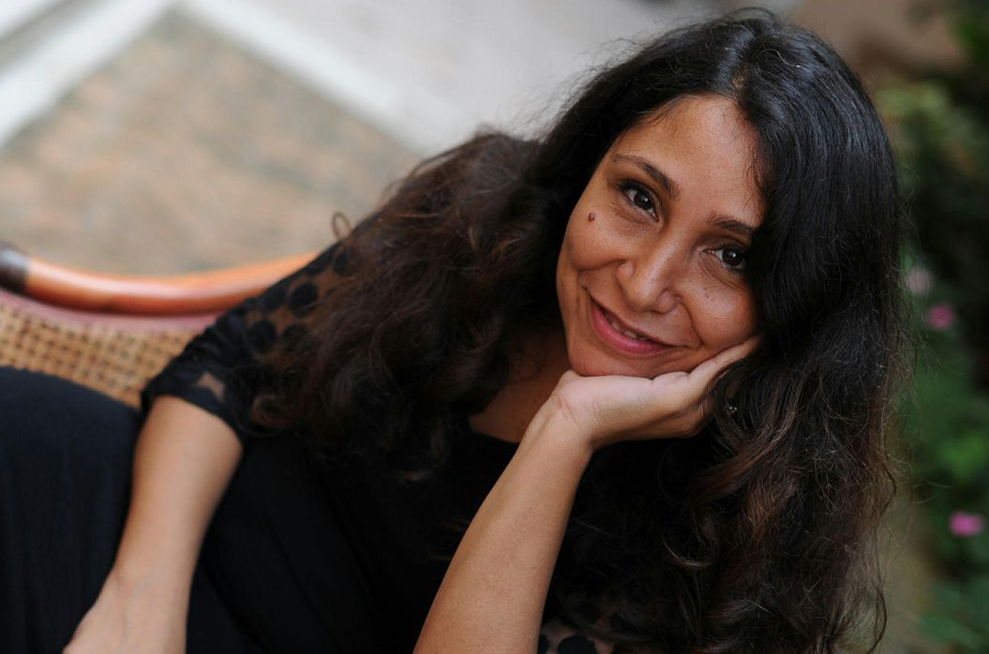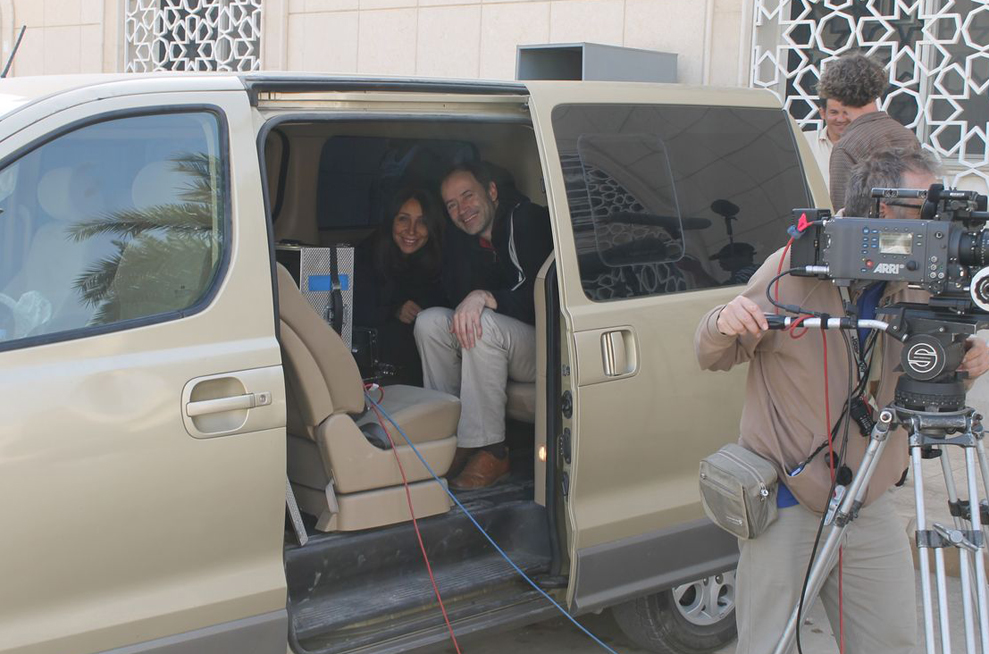The 7 Reasons We're In Awe Of This Woman: Saudi Arabia's First Female Film Director, Haifaa al-Mansour
Haifaa al-Mansour is Saudi Arabia’s first female film director and the first person to shoot an entire movie in the country. We've met her and can tell you that she is an incredible woman. Here's why...

Celebrity news, beauty, fashion advice, and fascinating features, delivered straight to your inbox!
You are now subscribed
Your newsletter sign-up was successful
Haifaa al-Mansour is Saudi Arabia’s first female film director and the first person to shoot an entire movie in the country. We've met her and can tell you that she is an incredible woman. Here's why...
Haifaa al-Mansour had to overcome a myriad of difficulties to get her new film, Wadjda, made. It’s the moving story of a feisty 10-year-old girl, who dreams of buying herself a bicycle, much to the dismay of her disapproving family and teachers. In the conservative area Wadjda comes from, respectable girls do not ride bikes or even laugh in public.
To give you an idea of the obstacles film director Haifaa had to overcome, here's a little bit of background: men and women are forbidden from speaking with each other in public in Saudi Arabia. So, when making the film, Haifaa was forced to communicate with her crew via walkie-talkie from the back of a van during outdoor filming.
She also had difficulty getting funding for the project, and casting actors and actresses for the movie was nearly impossible because the film industry in Saudi Arabia is practically non-existent. Add to this the death threats and hate mail that she has received in the past, and you can’t help but respect Haifaa’s determination and courage. Here are just some of the reasons why we admire her:
She has always broken with tradition
Haifaa comes from a very traditional background, making her work and lifestyle choices all the more impressive. ‘I come from a small town in Saudi Arabia,’ she explains. ‘I grew up with 12 kids and my parents are very “small-town” – they don’t speak English or anything…I grew up at a time in Saudi Arabia where it was very, very conservative and a lot of the religion and culture was about excluding women from public life.’
Despite this, Haifaa was always exposed to other cultures through her parents, unlike many of her contemporaries. This has no doubt influenced her broader outlook. 'Although my family is very traditional, we had access to films and novels…All my friends were saying “you are very corrupt now; you will go straight to Hell”, so my life was different in that way,’ she explains.
Celebrity news, beauty, fashion advice, and fascinating features, delivered straight to your inbox!
Luckily, things seem to be changing in Saudi Arabia now. ‘It’s exciting; it’s a moving society, a changing society,’ she explains. ‘They have access to the internet, they have satellite, people travel a lot more now and there are scholarships so their world is a lot more open, and they have a lot more opportunities than my generation.’ She wants to empower girls
Haifaa based the main character, Wadjda, on her niece, and wanted to make Saudi Arabian girls feel empowered through the film. ‘I based Wadjda a lot on my niece, who still lives in Saudi Arabia in a small town that sometimes isn’t even on the map,’ she says. ‘She’s a hustler and has a great sense of humour, and she’ll never take no for an answer. I felt it was amazing to see girls like this with great potential. Sometimes it gets lost in a conservative culture and I wanted to make the film to empower girls to be true to themselves and never give up and embrace their potential…My niece is very conservative now because my brother is conservative and she’s forced to conform, and I feel it’s a great loss of potential.’ She has brought about change
The film has already had a positive effect on the lives of girls in Saudi Arabia. ‘Girls can ride bikes in Saudi Arabia now,’ Haifaa is pleased to say. ‘It’s still Saudi so (they ride) in recreation areas and with male supervision,’ she adds. ‘But I still think it’s important to celebrate those achievements because it changes the way people think and changes the mindset and it’s very important.’
She is realistic about the fact that change won’t be instantaneous, though. ‘I feel change needs a lot of work,’ she says. ‘It doesn’t happen with one big thing; it happens with a lot of steady work and you need to put a lot of effort in, and you have to work hard every day on it, and have to push every day – it’s a lot of work and a lot of dedication.’

She’s tenacious
Haifaa initially had difficulties finding backers for her film, but didn’t give up and eventually received funding from Rotana Studios, an entertainment company owned by the Saudi Prince Al-Waleed bin Talal. ‘It was really hard to convince them to come on board,’ she explains. ‘It was very hard to convince anyone in the Middle East to come on board with this film because there is no drama and subtle things don’t sell (there)…So I was really grateful that the company (Rotana Studios) did because it is progressive and goes in line with Prince Al-Waleed’s ideas on empowering women and empowering film in Saudi Arabia.’
She also had trouble getting actors to join her cast. ‘Casting was difficult,’ she says. ‘We had to find a girl (to play Wadjda) and convince her parents. And we couldn’t put out an open casting call because we didn’t want to draw a lot of attention to the filming and we wanted everything to run smoothly, so we relied a lot on word-of-mouth and small production companies that recruit kids for religious festivals.’
It was also difficult getting established Saudi Arabian adult actors involved. ‘We don’t have movie theatres so the industry is not profitable,’ she explains. ‘TV is very profitable (though)…The actress who played the mother (Reem Abdullah) is a big TV star and doing a film felt like a little bit of a step-down for her because films from the Arab world are never distributed.’
She uses problems to her advantage
Haifaa was prevented from being as hands-on as she would have liked during filming, as a result of the gender segregation that exists in Saudi Arabia. She used something that might have hindered many directors to her advantage, though. ‘For me it made me work harder to find the essence of every scene,’ she explains. ‘Sometimes it is hard to find the heart of a scene because things get lost…I felt it was a very good exercise for me, an exercise to empower the actors to give their best performance because they understood what the scene was and why it was there.’

She’s respectful
Despite making a film about a rebellious young girl who defies ideas about what is respectable, Haifaa had no desire to cause offence. ‘I tried very much to make a film that is intimate, that does not clash with the culture as much as portray it and be part of it, and engage people in a dialogue,’ she says. ‘I was really nervous – I didn’t want people to feel upset or exposed because that wasn’t my intention. My intention was to make a film about Saudi Arabia and maintain my voice as a filmmaker.’
‘I think the country is opening up,’ she adds. ‘There is room now to make films, to do things, but you have to maintain respect for the culture – it’s conservative. But you can do things within that frame and maintain your voice.’
She sympathises with her critics
Haifaa understands why some conservative Saudi Arabians might be troubled by her work. ‘Saudi Arabia is not only politically conservative, the people themselves are very tribal and very conservative, and they resist change. I sympathise with (the fact that) it is hard for people to abandon views that they have thought are right for generations,’ she says. ‘They’ve just been told what is right and how things should be, and overnight they’re exposed to so many radical changes (so) they cling to tradition, they shun. I sympathise with that and I think it’s very important to give people time to embrace change and have their own pace.’
Wadjda is showing at cinemas from Friday, 19 July.